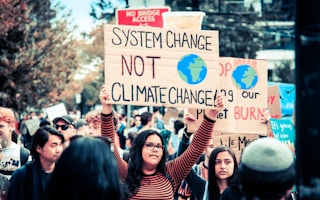Two months from now the annual United Nations climate conference will have begun, this year in the Scottish city of Glasgow. Campaign groups are already limbering up for the talks, COP-26, publishing the action they think is vital. Few are likely to be more compelling − and stark − than the declaration by more than 220 leading medical, nursing and public health journals: the climate and nature crisis is the biggest threat to the future health of the world.
The authors do not mince their words. “The science is unequivocal; a global increase of 1.5°C above the pre-industrial average and the continued loss of biodiversity risk catastrophic harm to health that will be impossible to reverse”, they write in an unprecedented joint editorial.
“Despite the world’s necessary preoccupation with Covid-19, we cannot wait for the pandemic to pass to rapidly reduce emissions.”
The crisis is an emergency which requires world leaders to transform societies and limit climate change, the editorial says. Their continued failure to do enough to keep the global temperature rise from exceeding 1.5°C above historic levels, and to restore nature, is the greatest threat to global public health.
In the United Kingdom the editorial is being published in one of the world’s oldest and most distinguished medical journals, The Lancet, and in the British Medical Journal. Other publishers include the East African Medical Journal, the Chinese Science Bulletin, the New England Journal of Medicine, titles in Brazil, India and Australia, and elsewhere. Never have so many journals combined to publish the same editorial.
Heat-related mortality, the health impacts of destructive weather, and widespread damage to ecosystems essential to human health are just a few of the impacts that a changing climate is causing to happen more often, the authors say. These impacts disproportionately affect the most vulnerable, including children and the elderly, ethnic minorities, poorer communities and those with underlying health conditions.
The editorial scorns recent targets to cut greenhouse gas emissions and protect nature: “These promises are not enough. Targets are easy to set and hard to achieve.” Significantly, it prescribes some hard-headed realism in attempts to limit temperature rise, describing plans to cut emissions to net zero by mid-century through removing greenhouse gases from the atmosphere − a still unproven technology − as “implausible”.
Throughout the editorial there echoes an insistence on the need for equity, for confronting the crisis without reliance on the failed nostrums of the past. “Equity must be at the centre of the global response … Wealthier countries will have to cut emissions more quickly, making reductions by 2030 beyond those currently proposed and reaching net-zero emissions before 2050. Similar targets and emergency action are needed for biodiversity loss and the wider destruction of the natural world.”
Governments must transform societies and economies, it says, by for example supporting the redesign of transport systems, cities, food production and distribution systems and financial investments markets, as well as health systems.
No to austerity
This would create high-quality jobs, reduce air pollution and increase physical activity, and improve housing and diet. Better air quality alone would lead to health benefits that easily offset the global costs of emissions cuts.
These measures, the editorial says, will also improve the social and economic factors which determine health; the poor state of these may have made populations more vulnerable to the Covid-19 pandemic.
But these changes “cannot be achieved through a return to damaging austerity policies or the continuation of the large inequalities of wealth and power within and between countries.” Rich countries should provide more generous funding for poorer ones − and it should take the form not of loans, but of grants,
The world is heading for a double disaster, the authors conclude: “Temperature increases are likely to be well in excess of 2°C, a catastrophic outcome for health and environmental stability.” And that’s far from all: “The destruction of nature does not have parity of esteem with the climate element of the crisis, and every single global target to restore biodiversity loss by 2020 was missed. This is an overall environmental crisis.”
This story was published with permission from Climate News Network.








